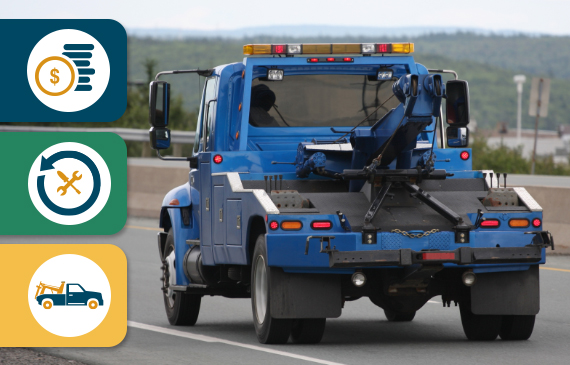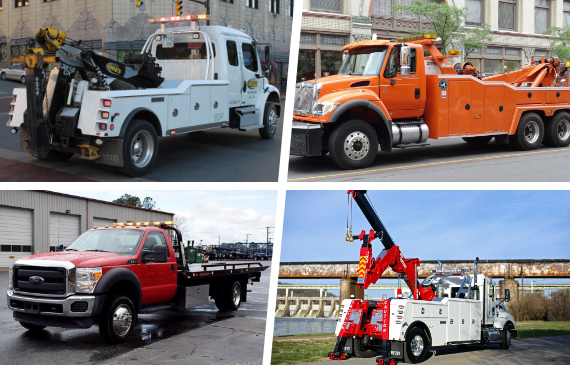Towing companies depend on reliable equipment, especially tow trucks, to provide necessary services, including transportation, car recovery, and roadside support. It can be expensive to purchase a tow truck, particularly for new and small enterprises.
A workable option that enables companies to update or buy necessary equipment without incurring upfront costs is tow truck financing. Businesses can spread out the cost over time with this flexible financing, which makes managing cash flow more accessible and guarantees liquidity.
Tax incentives and credit score enhancements can help towing companies maximize their financial resources and secure long-term success. However, towing companies must practice caution when evaluating used tow trucks for financing, as it is a significant investment.
In this article...
- What is a tow truck?
- What makes tow truck financing an optimal choice?
- Different types of tow trucks
- Tips to evaluate when financing a used tow truck
- The bottom line
This comprehensive guide provides a clear road map to help businesses make informed decisions and confidently negotiate the complexities of tow truck financing.
What is a Tow Truck?
A tow truck is a specialty vehicle meant to tow other cars incapable of moving alone. They transport vehicles that have been in accidents, are unlawfully parked, or have broken down while travelling.

Various tools, such as a winch, wheel-lift, side-puller, etc., are installed on tow trucks to raise one end of the vehicle for towing or to hoist disabled cars onto the truck bed. Some tow trucks can even handle huge vehicles such as buses, trucks, and construction equipment.
Expert drivers with the necessary skills ensure that tow trucks transfer cars safely. They are essential for cleaning up highways and guaranteeing security by eliminating dangerous vehicles and obstructions.
What Makes Tow Truck Financing an Optimal Choice?
Towing companies require dependable tow trucks, but initial costs might be expensive. Tow truck financing enables businesses to enhance operations and achieve sustainable growth without immediate investment. Let's examine the solid arguments for tow truck financing and why towing companies hoping to maximize their productivity and attain long-term success should carefully consider it.
Capital Accessibility:
Businesses can get the funds required to replace or buy vital equipment without worrying about upfront costs by financing a tow truck. This is especially helpful for new businesses and small companies that might not have or want to spend all their funds to buy a tow truck with cash.
Cash Flow Management:
Companies that use loans to spread out the expense of the tow truck over time can effectively manage their cash flow. This strategy protects their financial stability by ensuring they have the means to take care of other operational requirements and keep liquidity.
Tax Benefits:
Businesses may receive tax benefits from financing a tow vehicle. In many cases, a firm can reduce its overall tax burden and increase its financial efficiency by deducting the payments made or depreciating the asset on its taxes.
Credit Score Improvement:
Making on-time payments on a tow truck loan might help raise the company's credit rating. A higher credit score allows for better financing options and lower cost of funds, allowing for even more growth in the future.

Keeping Up with Technology:
Technological advancements in the towing sector improve efficiency and safety. Businesses may keep up with these advancements and satisfy the changing wants of their clientele by financing a tow truck. This keeps them competitive in the market.
Different Types of Tow Trucks
Tow trucks come in different varieties, each serving a distinct function. Here are a few of the most typical tow truck kinds:
Flatbed Tow Vehicles:
Flatbed tow trucks have a flat platform that can be lifted and lowered hydraulically. The tow car is positioned and fastened onto the platform. Flatbed tow trucks can haul most vehicles but are often preferred for luxury and all-wheel drive vehicles.
Wheel Lift Tow Trucks:
These trucks lift the front or rear end of the car from the ground using a hydraulic lift, leaving the other end of the vehicle on the road. In cases where all wheels need to be lifted you can add dollies to the other end to do so. This tow truck is ideal for quick services in emergency breakdowns and repossession situations.
Boom Tow Trucks:
A hydraulic arm on a boom tow truck reaches out to raise the car off the ground. This tow truck is ideal for recovery situations such as vehicles trapped in ditches, on a parking block or other difficult-to-reach areas.
Heavy-Duty Haul Trucks:
These trucks can haul big vehicles like buses and tractor-trailers. They can manage big and complicated towing duties with their heavy-duty towing system and optional winches and rotating booms.

These are only a few of the most popular types of tow trucks; variations may occur depending on the individual needs of the towing firm or situation.
Tips to Evaluate When Financing a Used Tow Truck:
This section offers crucial guidance on evaluating a used tow truck before financing, emphasizing checking important parts and analyzing maintenance logs. Its goal is to enable towing companies to acquire dependable equipment and make well-informed decisions.
Check the Vehicle History Report
Use the truck's vehicle identification number (VIN) to get a thorough car history record. This report provides valuable information on the truck's history of accidents, title status, odometer readings, and more, enabling informed selection.
Inspect the Exterior:
Carefully check the tow truck's exterior for any indications of corrosion, rust, or damage. Check the body for damage, and signage for damage, and make sure all lights work correctly to meet safety regulations. Inspect it for signs of prior collisions, such as dents or scrapes.
Examine the Undercarriage and Frame:
Assess the vehicle's structural integrity by looking for indications of corrosion, rust, or damage on the frame and undercarriage. Seek out any wear or leaks that might point to possible problems. Pay special attention to parts like the cross members, frame rails, and suspension components.
Examine the Towing Equipment:
Look over the bed, wheel-lift, winch, boom and other towing devices to ensure they are in good operating order. To ensure the straps and cables are sturdy enough to withstand towing activities, inspect and test the controls to ensure they function smoothly. Ensure the towing equipment meets the capacity requirements and is appropriate for usage.
Inspect the Engine:
Examine the engine thoroughly, checking for any indications of coolant or oil leaks. To guarantee optimum performance, check the coolant level, belts, hoses and other engine parts for wear and tear. You should also check the oil level and quality.

Turn on the engine and tune in for any odd sounds or vibrations that might point to underlying problems with the mechanics.
Review Maintenance Records:
Check the truck's maintenance history. Consistent brake inspections, oil changes, and other standard maintenance procedures indicate good maintenance and care, extending the truck's life. Ensure that all routine maintenance has been completed following the manufacturer's instructions.
Test Drive the Tow Truck:
Test drive the tow truck to assess its overall performance. Observe how the truck responds to steering, braking, and acceleration, and evaluate its responsiveness under various driving circumstances. To boost your confidence in the truck’s dependability, check the brakes to ensure they are quick and effective. You should listen for any strange engine, gearbox, or suspension noises.
Examine the Interior:
Consider the state of the dashboard, seats, and other parts of the interior. Ensure all gauges and controls function correctly and no signs of excessive wear or damage could compromise driver comfort or safety. Inspect the flooring, interior trim, and upholstery for indications of deterioration or wear.
Check for Legal Compliance:
Verify the tow truck's adherence to safety norms and local laws. Ensure your truck meets all legal requirements for public roads, including insurance, registration, licenses, permits, and a valid inspection sticker. The vehicle's weight rating and towing capacity must comply with all relevant regulations and be satisfactory for its intended use.
Consider the Mileage:
Pay attention to the truck's mileage and consider it while making decisions. Lower mileage indicates less usage and possibly fewer technical problems, which could affect the vehicle's overall longevity and dependability. Higher mileage, on the other hand, might imply more wear and tear. When evaluating the importance of mileage, consider the vehicle's overall condition, maintenance history, and service history.
Hire a Professional Inspector:
You should consider thoroughly inspecting the tow truck by a licensed technician or towing equipment professional. Expert inspections provide valuable insights into a truck’s condition, helping to identify potential issues that routine checks might overlook. The inspector assesses the vehicle's structural integrity, electrical systems, and mechanical parts, providing the necessary knowledge for an informed decision.
The Bottom Line:
Evaluating a used tow truck before financing is critical to ensuring you make a solid investment for your company. You may reduce risks and increase profits by using these detailed guidelines and performing a complete inspection, which will ultimately help your towing company succeed and expand.
When you're ready to take the next step, think about applying for financing for used tow trucks with Beacon Funding. This will help you meet your purchase demands and run your business with assurance and comfort.
GET STARTED NOW